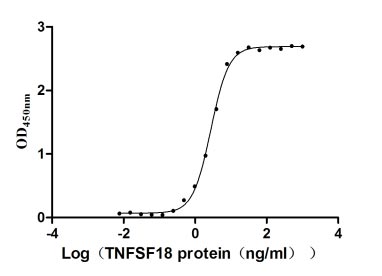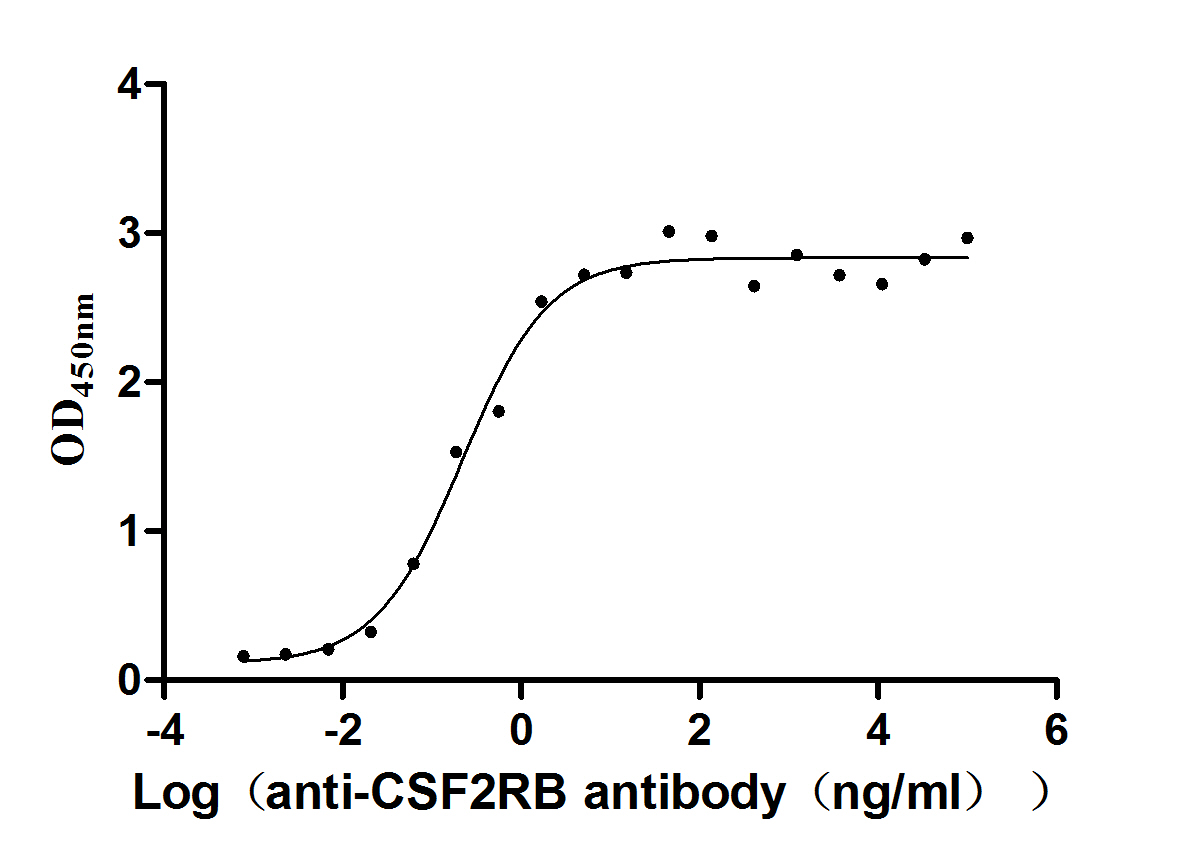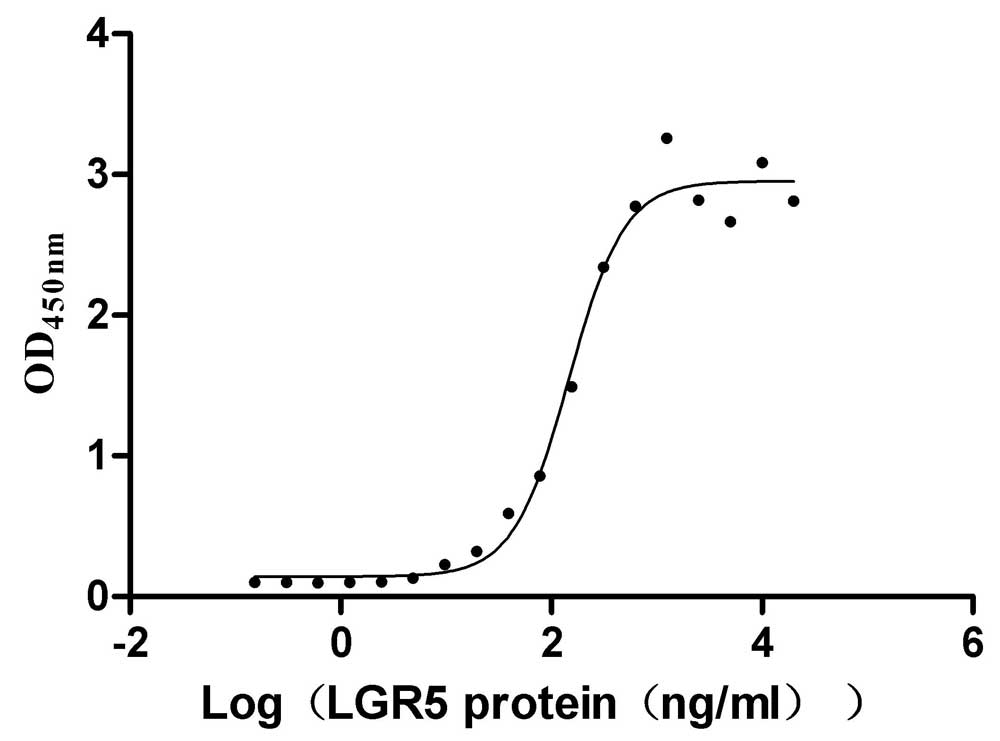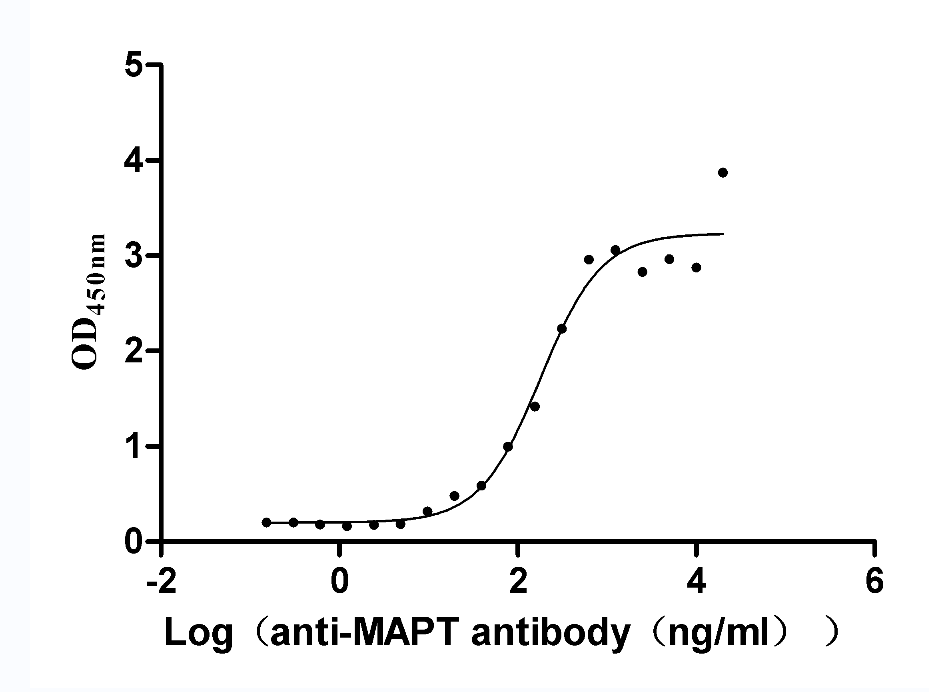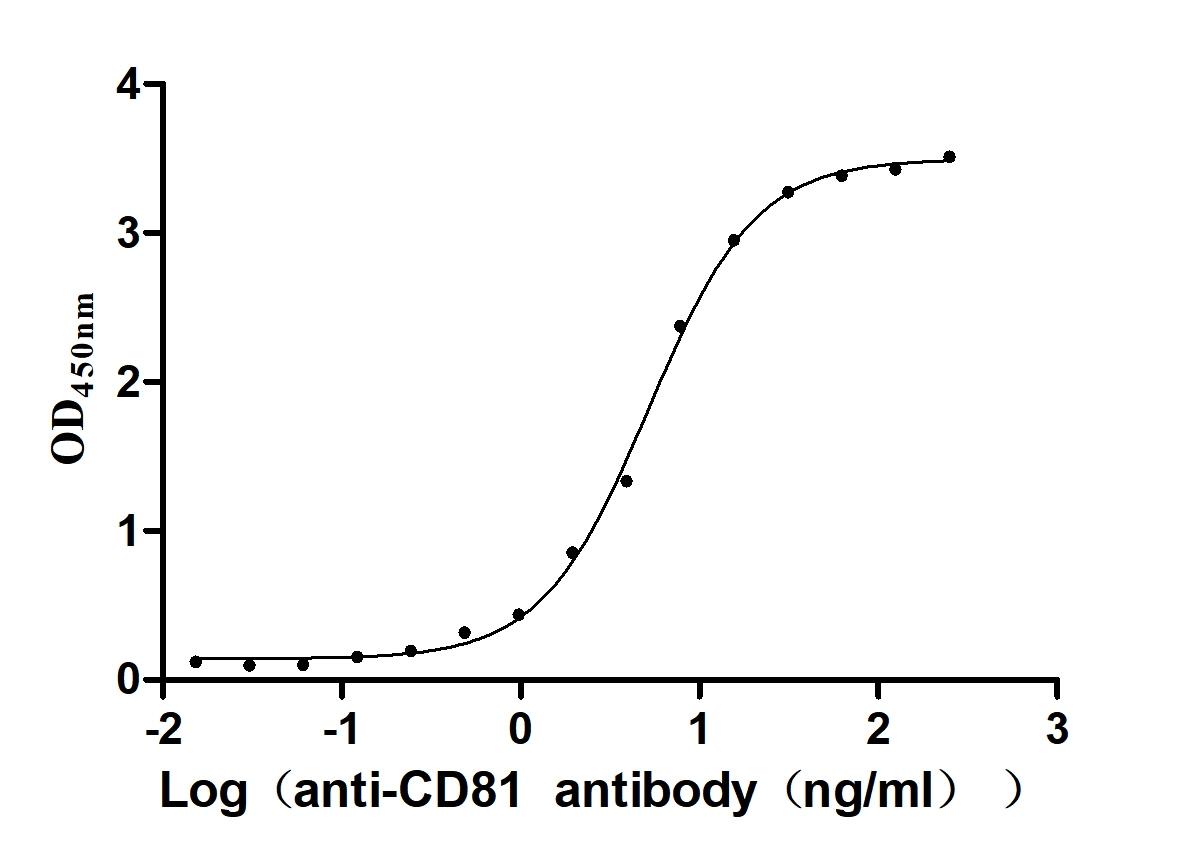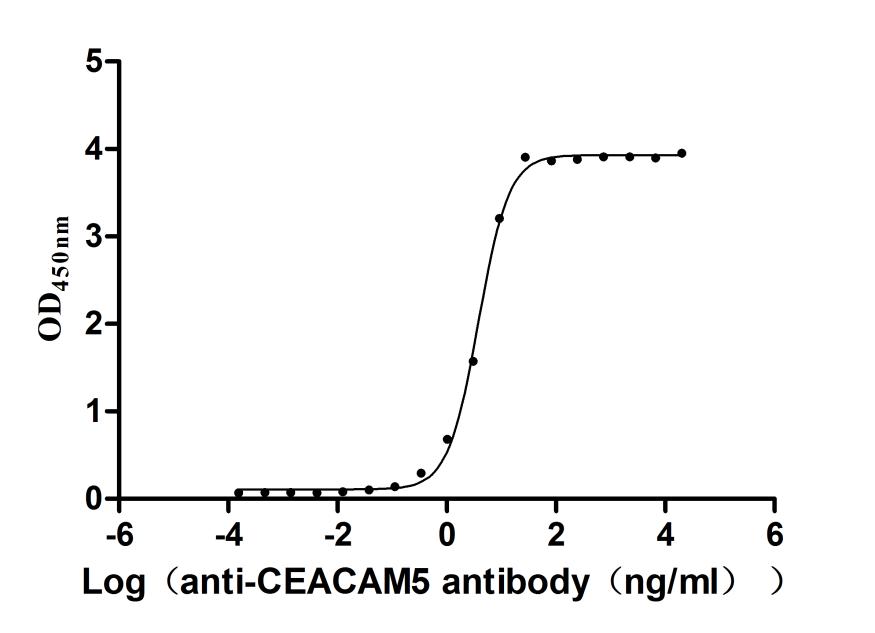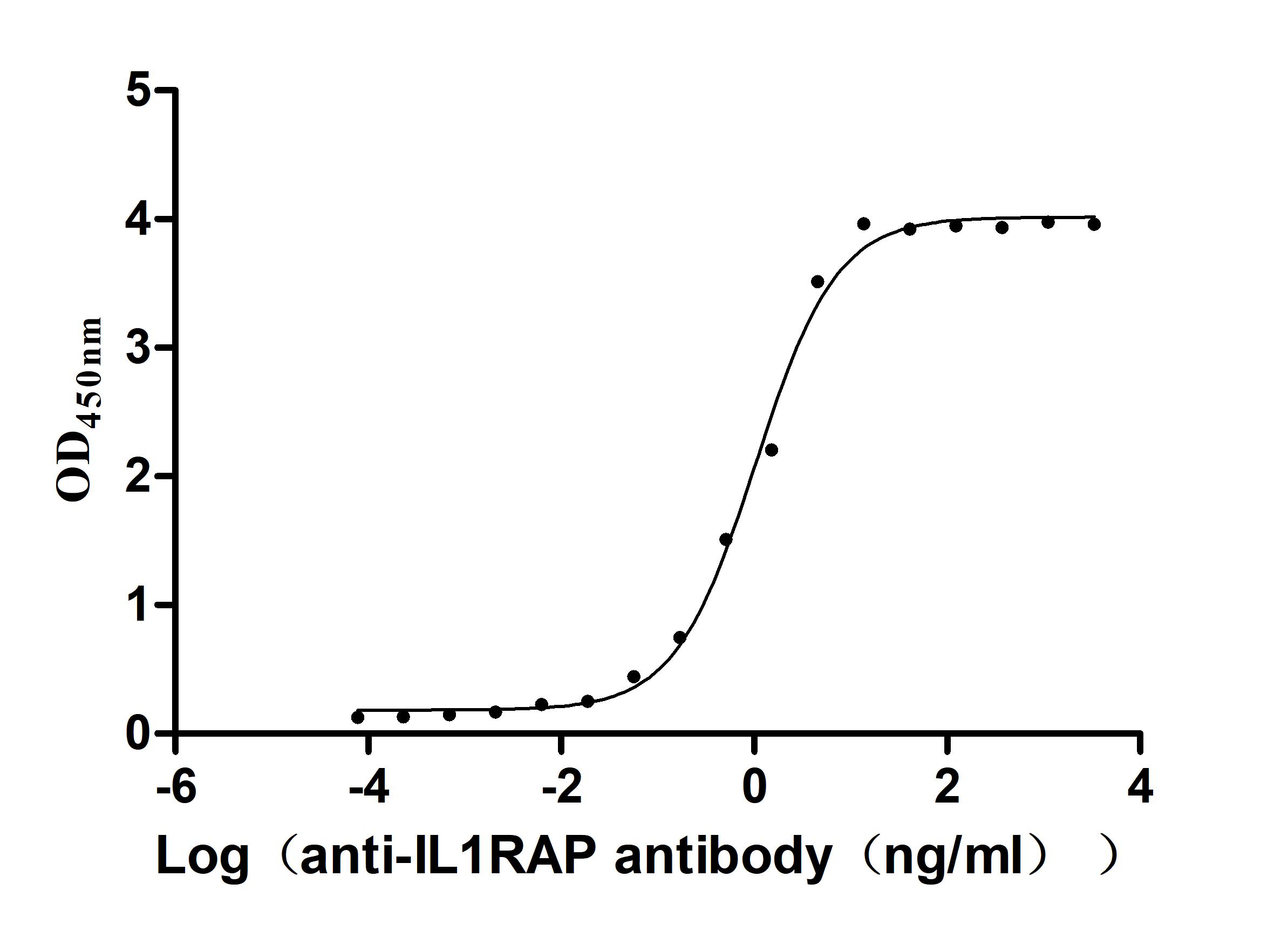Recombinant Mouse Protein S100-A4 (S100a4)
-
货号:CSB-YP020632MO
-
规格:
-
来源:Yeast
-
其他:
-
货号:CSB-EP020632MO
-
规格:
-
来源:E.coli
-
其他:
-
货号:CSB-EP020632MO-B
-
规格:
-
来源:E.coli
-
共轭:Avi-tag Biotinylated
E. coli biotin ligase (BirA) is highly specific in covalently attaching biotin to the 15 amino acid AviTag peptide. This recombinant protein was biotinylated in vivo by AviTag-BirA technology, which method is BriA catalyzes amide linkage between the biotin and the specific lysine of the AviTag.
-
其他:
-
货号:CSB-BP020632MO
-
规格:
-
来源:Baculovirus
-
其他:
-
货号:CSB-MP020632MO
-
规格:
-
来源:Mammalian cell
-
其他:
产品详情
-
纯度:>85% (SDS-PAGE)
-
基因名:
-
Uniprot No.:
-
别名:S100a4; Capl; Mts1; Protein S100-A4; Metastasin; Metastatic cell protein; PEL98; Placental calcium-binding protein; Protein 18A2; Protein Mts1; S100 calcium-binding protein A4
-
种属:Mus musculus (Mouse)
-
蛋白长度:Full Length of Mature Protein
-
表达区域:2-101
-
氨基酸序列ARPLEEALD VIVSTFHKYS GKEGDKFKLN KTELKELLTR ELPSFLGKRT DEAAFQKVMS NLDSNRDNEV DFQEYCVFLS CIAMMCNEFF EGCPDKEPRK K
-
蛋白标签:Tag type will be determined during the manufacturing process.
The tag type will be determined during production process. If you have specified tag type, please tell us and we will develop the specified tag preferentially. -
产品提供形式:Lyophilized powder
Note: We will preferentially ship the format that we have in stock, however, if you have any special requirement for the format, please remark your requirement when placing the order, we will prepare according to your demand. -
复溶:We recommend that this vial be briefly centrifuged prior to opening to bring the contents to the bottom. Please reconstitute protein in deionized sterile water to a concentration of 0.1-1.0 mg/mL.We recommend to add 5-50% of glycerol (final concentration) and aliquot for long-term storage at -20℃/-80℃. Our default final concentration of glycerol is 50%. Customers could use it as reference.
-
储存条件:Store at -20°C/-80°C upon receipt, aliquoting is necessary for mutiple use. Avoid repeated freeze-thaw cycles.
-
保质期:The shelf life is related to many factors, storage state, buffer ingredients, storage temperature and the stability of the protein itself.
Generally, the shelf life of liquid form is 6 months at -20°C/-80°C. The shelf life of lyophilized form is 12 months at -20°C/-80°C. -
货期:Delivery time may differ from different purchasing way or location, please kindly consult your local distributors for specific delivery time.Note: All of our proteins are default shipped with normal blue ice packs, if you request to ship with dry ice, please communicate with us in advance and extra fees will be charged.
-
注意事项:Repeated freezing and thawing is not recommended. Store working aliquots at 4°C for up to one week.
-
Datasheet :Please contact us to get it.
相关产品
靶点详情
-
功能:Calcium-binding protein that plays a role in various cellular processes including motility, angiogenesis, cell differentiation, apoptosis, and autophagy. Increases cell motility and invasiveness by interacting with non-muscle myosin heavy chain (NMMHC) IIA/MYH9. Mechanistically, promotes filament depolymerization and increases the amount of soluble myosin-IIA, resulting in the formation of stable protrusions facilitating chemotaxis. Modulates also the pro-apoptotic function of TP53 by binding to its C-terminal transactivation domain within the nucleus and reducing its protein levels. Within the extracellular space, stimulates cytokine production including granulocyte colony-stimulating factor and CCL24 from T-lymphocytes. In addition, stimulates T-lymphocyte chemotaxis by acting as a chemoattractant complex with PGLYRP1 that promotes lymphocyte migration via CCR5 and CXCR3 receptors.
-
基因功能参考文献:
- S100A4 knockout alone inhibits ATC cells (rich endogenous S100A4) survival and invasion, regardless of the BRAFV600E status, and potentiates the effect of vemurafenib on tumor regression in vitro and in vivo. PMID: 30196299
- Knockdown of S100A4 significantly reduced cardiac fibrosis and beta-catenin levels. PMID: 29758552
- High S100A4 expression is associated with Mesenchymal Transition in Glioblastoma. PMID: 28807938
- findings indicate that Idiopathic pulmonary fibrosis mesenchymal progenitor cells are intrinsically fibrogenic and that S100A4 confers mesenchymal progenitor cells with fibrogenicity. PMID: 28530639
- Data provide the first report on the in vivo role of S100a4 in intestinal tumourigenesis and describe a new role for S100a4 in the aetiology of desmoids formation. PMID: 27750112
- S100A4 expression protects cardiac myocytes against myocardial ischemia and is required for stabilization of cardiac function after MI. PMID: 27721024
- These findings provide further evidence on extracellular S100A4 as paracrine mediator of prometastatic endothelial dysfunction involving its interaction with RAGE. PMID: 27387233
- this study has demonstrated a crucial role for retinoic acid in promoting IL-22 production and tempering dendritic cell function through downregulating S100A4 protein during viral hepatitis PMID: 28363907
- Extracellular S100A4 is important for the regulation of bone formation by activating the NF-kappaB signaling pathway in osteoblasts. PMID: 27998393
- Interaction of extracellular S100A4 with RAGE prompts prometastatic activation of melanoma cells. PMID: 26928771
- Our results indicated that RNV was ameliorated by Ad-S100A4-RNAi transfer in a mouse model of OIR through mediation of the anti-apoptotic effect of Bcl-2 by reducing the expression of CREB. PMID: 26358273
- The thymic CD45-FSP1+ cells are a subpopulation of fibroblasts, which is crucial for the maintenance and regeneration of thymic epithelial cells. PMID: 26445893
- Enhanced S100A4 expression was observed in remodeled intrapulmonary arteries of mice with smoke-induced emphysema. PMID: 26483185
- Downregulation of AKT3 increases migration and metastasis in triple negative breast cancer cells by upregulating S100A4. PMID: 26741489
- S100A4 promotes liver fibrosis by activating HSCs, which may represent a potential target for anti-fibrotic therapies. PMID: 25111176
- The S100A4 blocking antibody (6B12) reduces tumor growth and metastasis in a model of spontaneous breast cancer. PMID: 25884510
- Functional studies of human TH2 cells as well as mouse models of allergy showed that deletion of one of the genes, S100A4, resulted in decreased signs of allergy. PMID: 24401939
- S100A4 in endothelial cells is involved in tube formation, and suggest its potential as a molecular target for inhibiting tumor angiogenesis PMID: 23929008
- S100A4 is overexpressed in an experimental head and neck squamous cell carcinoma, and its inhibition reduces tumor burden. PMID: 24037664
- interaction of macrophage-derived S100A4 with B16-F10 melanoma results in increased metastatic lung colonization in vivo PMID: 24613382
- S100A4 is a regulator of bone formation, which inhibits bone excess in the estrogen-sufficient mice and prevents the cortical bone loss in the estrogen-deprived mice. PMID: 23798573
- the role of S100A4 in bone homeostasis, was analysed. PMID: 23830916
- FSP1 is not a specific marker for fibroblasts in cardiac remodeling and fibrosis. PMID: 23997102
- The S100A4 protein, mostly studied in cancer, is overexpressed in the damaged human and rodent brain and released from stressed astrocytes. PMID: 23149742
- S100A4/Mts1 over-expression combined with female gender is permissive to the development of experimental pulmonary arterial hypertension in mice PMID: 22185646
- Bone marrow-derived FSP-1(+) cells enhance neointima formation through an increase in transendothelial invasion with stimulation of smooth muscle cell proliferation. FSP-1 silencing in bone marrow cells suppresses neointima formation in vein graft. PMID: 22116816
- S100A4 in the peripheral circulation may play a role in the induction of blood-brain barrier disruption under the inflammation associated with rheumatoid arthritis. PMID: 21627981
- Data show that reduction in metastasis due to the loss of S100A4(+) fibroblasts correlated with a concomitant decrease in the expression of several ECM molecules and growth factors, particularly Tenascin-C and VEGF-A. PMID: 21911392
- A lack of S100A4 results in mobilization of systemic inflammation, more efficient bacterial clearance, and increased protection against joint destruction caused by staphylococcal arthritis. PMID: 21844298
- causative role of S100A4 in osteosarcoma lung metastasis shown in the murine xenograft model PMID: 21360024
- demonstrate pro-metastatic function of S100A4 in the tumor microenvironment and define how the tumor cell-derived cytokine RANTES acts as a critical regulator of S100A4-dependent tumor cell dissemination. PMID: 20442771
- role of S100A4 in normal mammary gland, its spatial and temporal expression patterns and possible function in branching morphogenesis PMID: 21195708
- FSP1 is a marker of a specific subset of inflammatory macrophages in liver injury, fibrosis, and cancer. PMID: 21173249
- These studies establish S100A4 as a regulator of physiological macrophage motility and demonstrate that S100A4 mediates macrophage recruitment and chemotaxis in vivo. PMID: 20519440
- S100A4 activates NF-kappaB by inducing phosphorylation of IKKalpha/beta, leading to increased IkappaBalpha phosphorylation in osteosarcoma cells. PMID: 20507646
- Data show that in S100A4(-/-) PyMT tumors, a significant suppression of T-cell infiltration was found at the transition period. PMID: 20103644
- Calcium coordination studies of the metastatic Mts1 protein PMID: 11914069
- the functional role of S100A4 in regulating endothelial cell growth and tumor metastasis involves interaction with the N-terminal half of Methionine Aminopeptidase 2. PMID: 11994292
- Sequence-specific chemical shift assignment of calcium-loaded murine S100A4 PMID: 12153041
- role as negative regulator of mineralization and osteoblast differentiation PMID: 12619934
- metastasis-inducing S100A4 protein plays a pivotal role in the tumor-stroma environment PMID: 15047714
- These data indicate that S100A4 reduces the migratory capacity of reactive white matter astrocytes in the injured CNS and is involved in glial scar formation after injury. PMID: 16463066
- S100A4 expression was many -fold greater in the papilla as compared with the cortex and increased further in the papilla upon 36 h of thirsting in kidney in response to hypertonic stress PMID: 17200116
- Overexpression of S100A4 protein is associated with liver metastasis in pancreatic cancer PMID: 17786304
- Enhanced generation of elastin peptides in S100A4/Mts1 mice may promote increased viral entry in the vessel wall. PMID: 18083765
- comparison of secretion of S100A4 from tumor cells & lymphocytes; injection of antibodies to S100A4 to mice with transplanted M3 melanoma inhibited tumor growth suggesting S100A4 production protects tumor cells from cytotoxicity of immunocompetent cells PMID: 19024009
显示更多
收起更多
-
亚细胞定位:Secreted. Nucleus. Cytoplasm.
-
蛋白家族:S-100 family
-
组织特异性:Specifically expressed in different metastatic cells.
-
数据库链接:
KEGG: mmu:20198
STRING: 10090.ENSMUSP00000001046
UniGene: Mm.3925
Most popular with customers
-
Recombinant Human Tumor necrosis factor ligand superfamily member 18 (TNFSF18), partial (Active)
Express system: Mammalian cell
Species: Homo sapiens (Human)
-
Recombinant Human Cytokine receptor common subunit beta (CSF2RB), partial (Active)
Express system: Mammalian cell
Species: Homo sapiens (Human)
-
Recombinant Human R-spondin-1 (RSPO1), partial (Active)
Express system: Mammalian cell
Species: Homo sapiens (Human)
-
Recombinant Rat Microtubule-associated protein tau (Mapt) (Active)
Express system: Mammalian cell
Species: Rattus norvegicus (Rat)
-
Recombinant Human CD81 antigen (CD81), partial (Active)
Express system: Mammalian cell
Species: Homo sapiens (Human)
-
Recombinant Macaca fascicularis Transmembrane 4 L6 family member 1 (TM4SF1)-VLPs (Active)
Express system: Mammalian cell
Species: Macaca fascicularis (Crab-eating macaque) (Cynomolgus monkey)
-
Express system: Mammalian cell
Species: Macaca mulatta (Rhesus macaque)
-
Recombinant Macaca fascicularis Interleukin 1 receptor accessory protein(IL1RAP), partial (Active)
Express system: Mammalian cell
Species: Macaca fascicularis (Crab-eating macaque) (Cynomolgus monkey)


